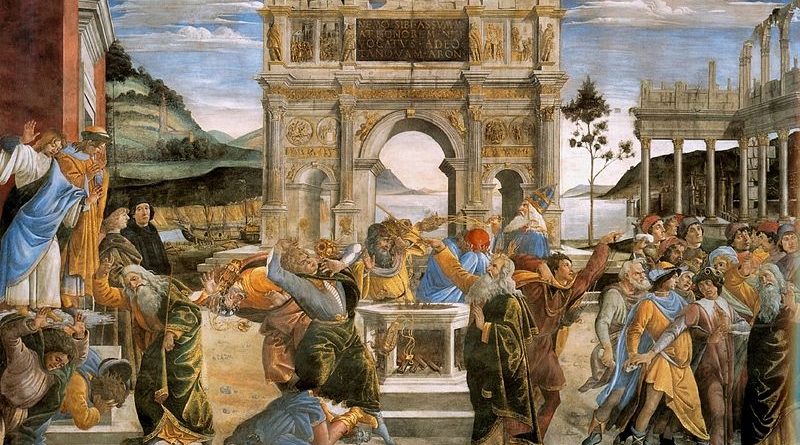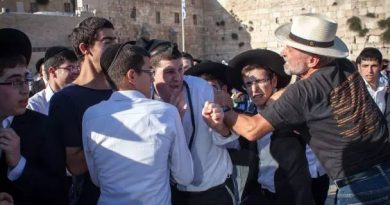Korach 5779 – Change is Hard
Change is hard.
Change is necessary.
Change is inevitable.
In this week’s Torah portion, a man named Korach wants change. He leads a rebellion against the leadership of Moses and Aaron, saying:
רַב־לָכֶם֒ כִּ֤י כָל־הָֽעֵדָה֙ כֻּלָּ֣ם קְדֹשִׁ֔ים וּבְתוֹכָ֖ם יְי וּמַדּ֥וּעַ תִּֽתְנַשְּׂא֖וּ עַל־קְהַ֥ל יְי׃
You have gone too far! For all the community are holy, all of them, and the LORD is in their midst. Why then do you raise yourselves above the LORD’s congregation?
Not only does Korach want change, he’s trying to be the change agent, the one making change happen.
His effort to bring about change fails. In a dramatic showdown that would make a great scene in a movie, there’s a “shoot-out” with “fire pans.”
You have Korach and his 250 followers with burning incense in their fire pans on one side, and Moses and Aaron burning incense in their fire pans on the other side. Moses yells out a challenge…”we’ll see who God likes!” and the earth opens up and swallows Korach, his followers, and all of their stuff.
Change was delayed, but change was still inevitable. Some years later, God tells Moses he’s not going to be given the opportunity to go into the Promised Land. He gets to see it from afar, but it’s time for a change in leadership. His disciple Joshua, one of the “good spies” we read about in last week’s Torah reading, is anointed leader and brings the people into the land of Israel.
There are profound differences in Korach’s failed attempt at bringing about change, and the successful change that came later. What are some of those differences?
Korach was pushing change not because it was necessary, but because of his own selfish reasons. He wanted to be the leader. He didn’t care what others wanted, or what would be good for the community. He didn’t consult anyone about whether he’s the most suitable person to be the leader.
When Joshua was chosen as leader, things were very different.
Change was necessary: Moses was 120 years old, he’d lived his allotted time, and someone else had to be the one to bring the Israelites into the Promised Land.
Joshua may not have been democratically elected, but he was directly chosen by God. You don’t get a better reference than that on whether someone is suitable for leadership.
But even for Joshua, change was difficult. As we read in the book of Joshua, not everyone obeyed his orders when it came to the procedures to be followed when they conquered Jericho.
What we can learn from contrasting the attempted changes in this week’s Torah reading, and the more successful changes when Joshua was put in charge is that change should happen in the right time, at the right pace, and in the right way.
We don’t have God directly giving us instructions, however. So it’s not always easy to figure out the right timing, pace, and way of bringing about change.
One of the Conservative Movement’s mottos is “Tradition and Change.” As a movement, we live in the tension between maintaining the traditions of our ancestors while changing enough to remain relevant as the world around us changes.
For me, Conservative Judaism is the “Goldilocks” of Judaism. We have the temperature just right. The Orthodox are so wedded to tradition that they fail to adequately adapt to the changed role and status of women in our society, or to the spiritual needs of people who are primarily living in a modern, secular, world. The Reform are so much about personal autonomy and accessibility that for me they’ve lost some of the important things that make Judaism Judaism. The fact that our movement has had mighty struggles over issues such as women rabbis, the treatment of people with different sexual orientations or gender identities, interfaith marriage, music on Shabbat, and on and on is proof to me that we’re doing things the right way. These should be difficult decisions.
The Conservative Movement is a pluralistic movement. There is no central authority that tells rabbis, and by extension their congregations, how things have to be done. There are still some Conservative congregations that are not fully egalitarian. There are some Conservative rabbis who would never agree to officiate at a same sex marriage. Rules from one congregation to another on subjects such as kashrut, music on Shabbat, and the status of interfaith families vary tremendously.
If we were making an analogy from the story of Moses and Joshua, I’m neither. I’m not the “old guard” who has led the way for 40 years, and I’m not the leader for the next generation. I’m a change agent. I’m here to help Herzl Ner Tamid successfully negotiate a period of transition.
Unlike Korach in this week’s Torah portion, I’m not here to advance my personal agenda. If I were going to be your rabbi for the next decade or more, my personal preferences would be a lot more relevant.
One of the things I hope to do over the next year is help the congregation figure out where you want to be on that spectrum of tradition and change. We can do some experiments. We can try some things and see what works for the community.
This is my first Shabbat leading services here. I don’t know the community yet. Let’s have a little discussion, right now, that will help me get to know you better. Let’s start with, what are some of the traditions you have here at Herzl Ner Tamid that you want to preserve?
(DISCUSSION)
Now what are some of things that you’d like to see change?
(DISCUSSION)
I am honored to have been chosen to be your spiritual leader during this time of transition, and I look forward to continuing this discussion, whether at kiddush, over coffee, or in a more structured setting.
May the Kadosh Baruch Hu, the Blessed Holy One, support us in our efforts to walk the best path between tradition and change,
Amen


